Achieving Sustainability: Challenges and Perspectives Essay
VerifiedAdded on 2023/04/21
|8
|2123
|160
Essay
AI Summary
This essay examines the complexities of achieving sustainability, particularly within developing countries. It argues that while sustainability is an ideal, it is difficult to attain due to factors such as resource exploitation, rapid population growth, environmental degradation, and the prioritization of profit over environmental concerns. The essay highlights challenges like lack of financial resources, inadequate infrastructure, and the absence of coherent policies in developing nations. It explores how developing countries are influenced by globalization and the green economy, and the difficulties they face in adopting renewable energy and financial literacy programs. The author suggests that the mentality of people and the financial constraints faced by developing countries pose significant barriers to achieving sustainability, making it a distant goal for many. The essay concludes by emphasizing the need for innovative approaches and systemic transformations to address these challenges and work toward a more sustainable future.
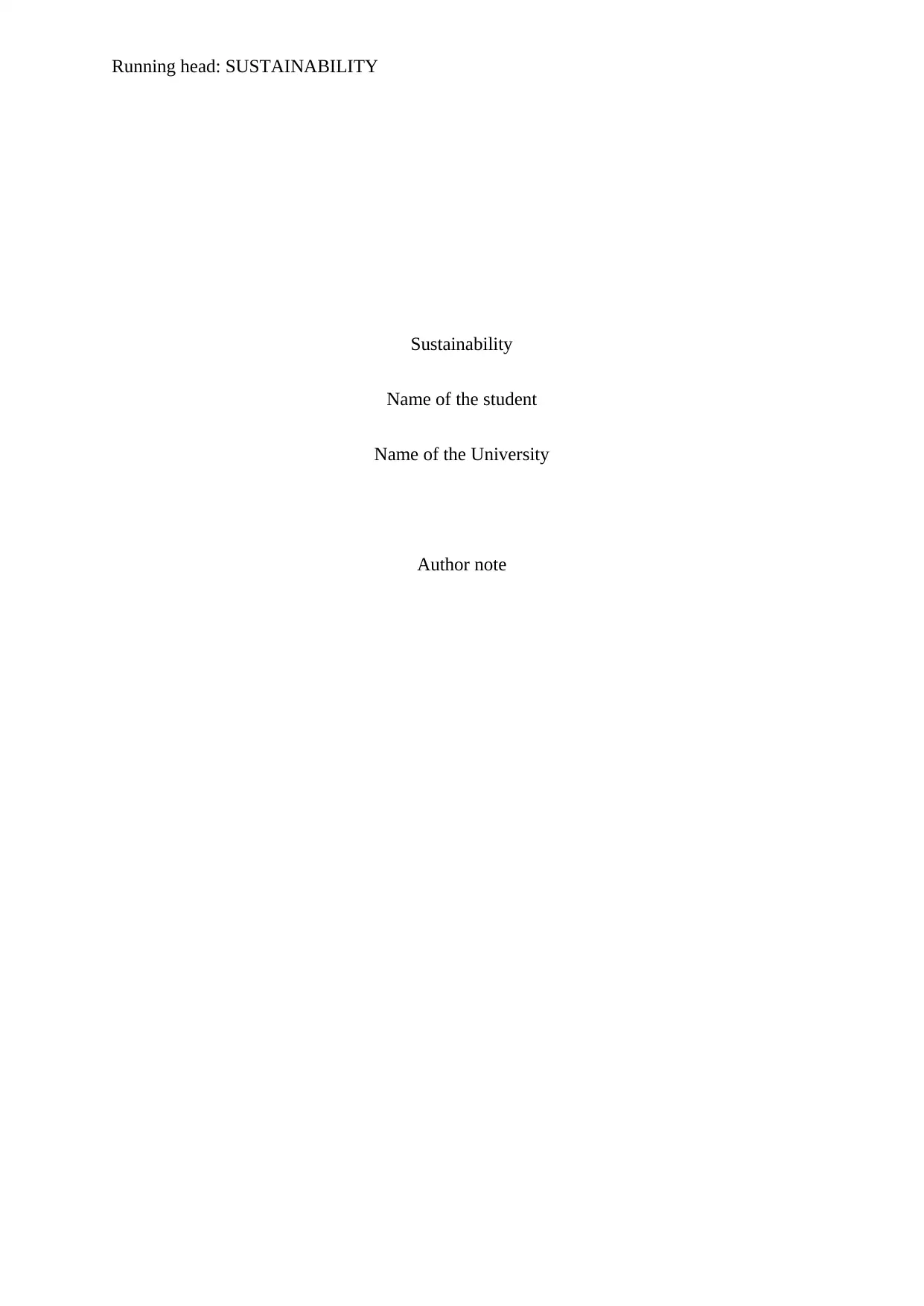
Running head: SUSTAINABILITY
Sustainability
Name of the student
Name of the University
Author note
Sustainability
Name of the student
Name of the University
Author note
Paraphrase This Document
Need a fresh take? Get an instant paraphrase of this document with our AI Paraphraser
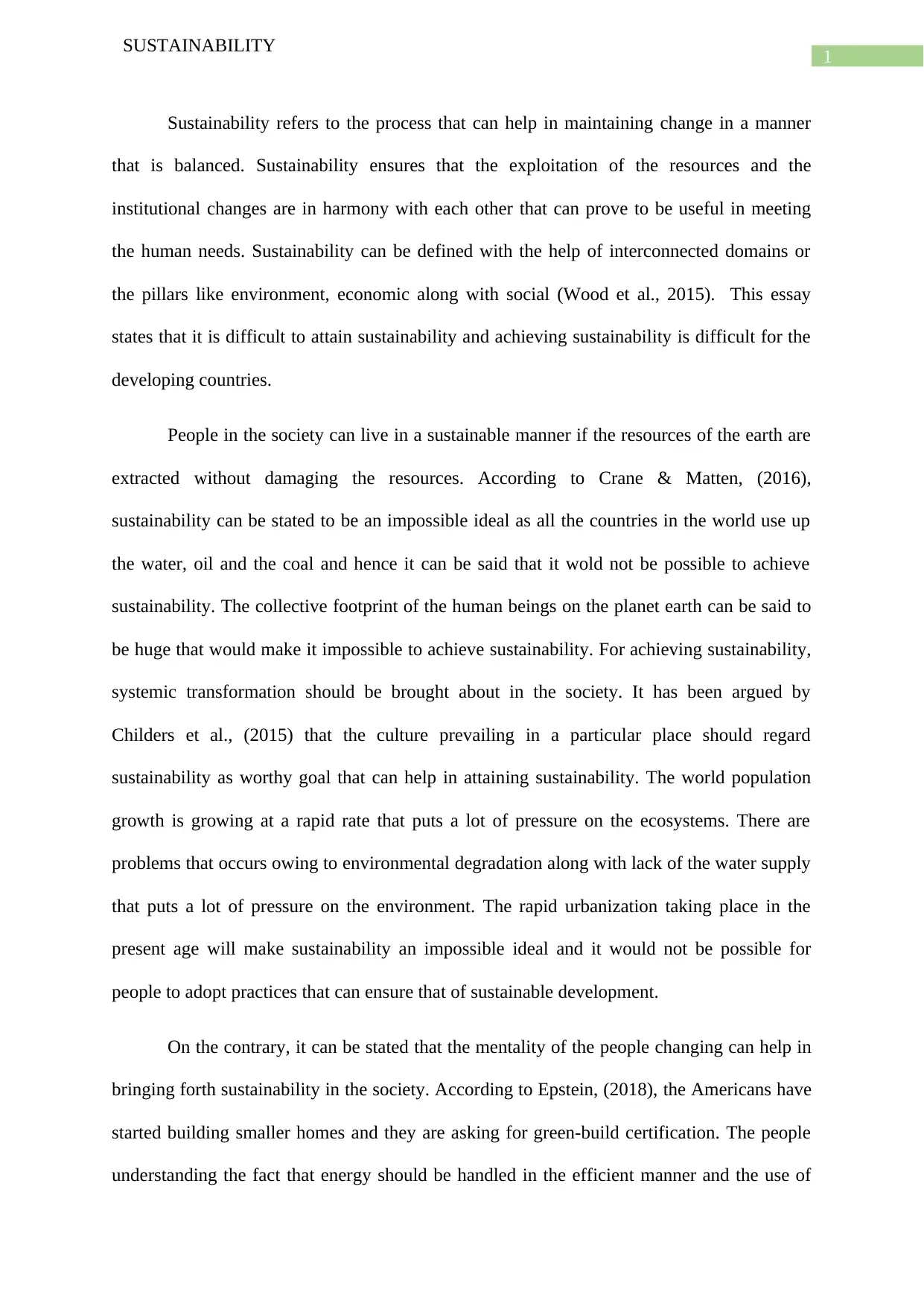
1
SUSTAINABILITY
Sustainability refers to the process that can help in maintaining change in a manner
that is balanced. Sustainability ensures that the exploitation of the resources and the
institutional changes are in harmony with each other that can prove to be useful in meeting
the human needs. Sustainability can be defined with the help of interconnected domains or
the pillars like environment, economic along with social (Wood et al., 2015). This essay
states that it is difficult to attain sustainability and achieving sustainability is difficult for the
developing countries.
People in the society can live in a sustainable manner if the resources of the earth are
extracted without damaging the resources. According to Crane & Matten, (2016),
sustainability can be stated to be an impossible ideal as all the countries in the world use up
the water, oil and the coal and hence it can be said that it wold not be possible to achieve
sustainability. The collective footprint of the human beings on the planet earth can be said to
be huge that would make it impossible to achieve sustainability. For achieving sustainability,
systemic transformation should be brought about in the society. It has been argued by
Childers et al., (2015) that the culture prevailing in a particular place should regard
sustainability as worthy goal that can help in attaining sustainability. The world population
growth is growing at a rapid rate that puts a lot of pressure on the ecosystems. There are
problems that occurs owing to environmental degradation along with lack of the water supply
that puts a lot of pressure on the environment. The rapid urbanization taking place in the
present age will make sustainability an impossible ideal and it would not be possible for
people to adopt practices that can ensure that of sustainable development.
On the contrary, it can be stated that the mentality of the people changing can help in
bringing forth sustainability in the society. According to Epstein, (2018), the Americans have
started building smaller homes and they are asking for green-build certification. The people
understanding the fact that energy should be handled in the efficient manner and the use of
SUSTAINABILITY
Sustainability refers to the process that can help in maintaining change in a manner
that is balanced. Sustainability ensures that the exploitation of the resources and the
institutional changes are in harmony with each other that can prove to be useful in meeting
the human needs. Sustainability can be defined with the help of interconnected domains or
the pillars like environment, economic along with social (Wood et al., 2015). This essay
states that it is difficult to attain sustainability and achieving sustainability is difficult for the
developing countries.
People in the society can live in a sustainable manner if the resources of the earth are
extracted without damaging the resources. According to Crane & Matten, (2016),
sustainability can be stated to be an impossible ideal as all the countries in the world use up
the water, oil and the coal and hence it can be said that it wold not be possible to achieve
sustainability. The collective footprint of the human beings on the planet earth can be said to
be huge that would make it impossible to achieve sustainability. For achieving sustainability,
systemic transformation should be brought about in the society. It has been argued by
Childers et al., (2015) that the culture prevailing in a particular place should regard
sustainability as worthy goal that can help in attaining sustainability. The world population
growth is growing at a rapid rate that puts a lot of pressure on the ecosystems. There are
problems that occurs owing to environmental degradation along with lack of the water supply
that puts a lot of pressure on the environment. The rapid urbanization taking place in the
present age will make sustainability an impossible ideal and it would not be possible for
people to adopt practices that can ensure that of sustainable development.
On the contrary, it can be stated that the mentality of the people changing can help in
bringing forth sustainability in the society. According to Epstein, (2018), the Americans have
started building smaller homes and they are asking for green-build certification. The people
understanding the fact that energy should be handled in the efficient manner and the use of
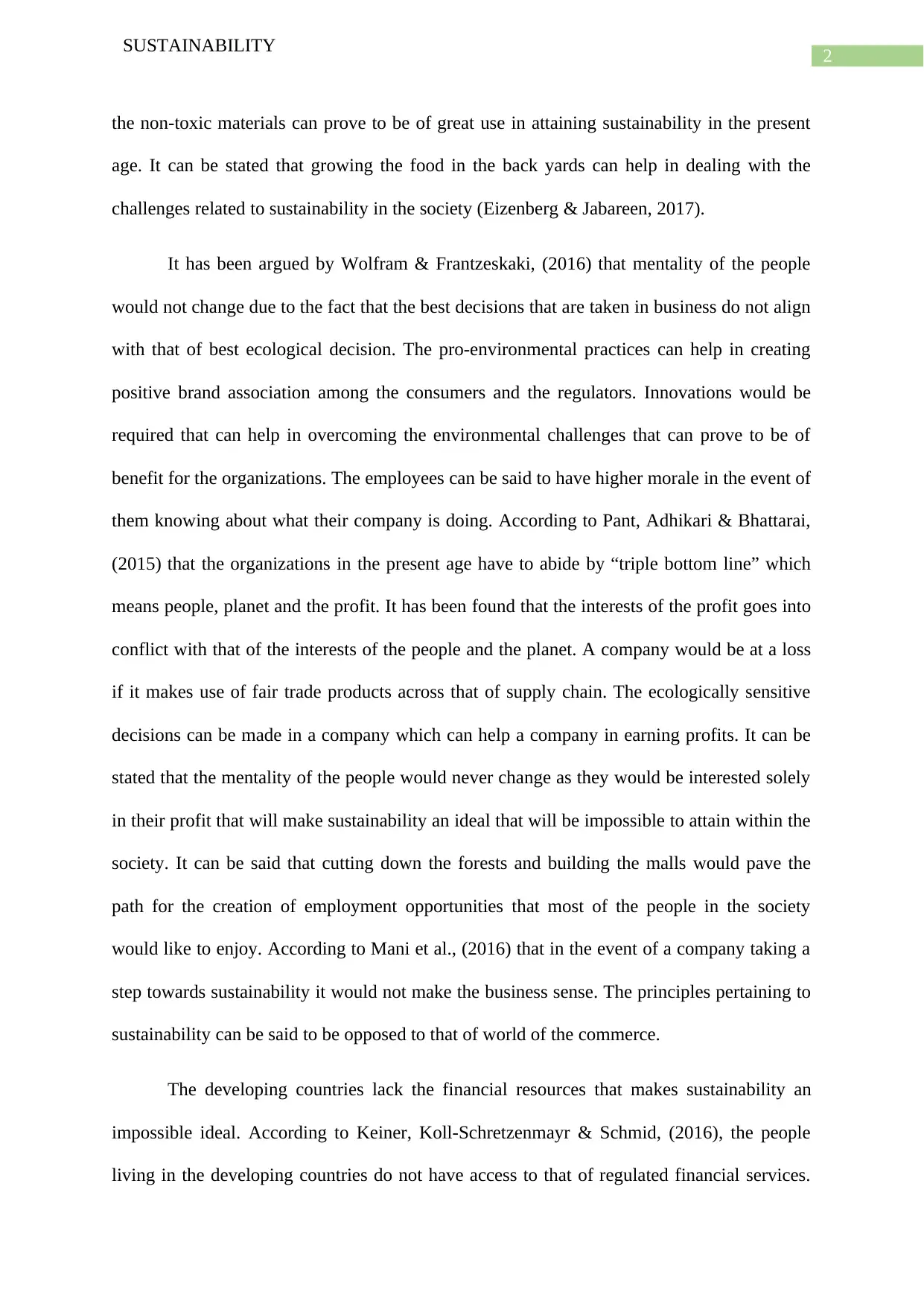
2
SUSTAINABILITY
the non-toxic materials can prove to be of great use in attaining sustainability in the present
age. It can be stated that growing the food in the back yards can help in dealing with the
challenges related to sustainability in the society (Eizenberg & Jabareen, 2017).
It has been argued by Wolfram & Frantzeskaki, (2016) that mentality of the people
would not change due to the fact that the best decisions that are taken in business do not align
with that of best ecological decision. The pro-environmental practices can help in creating
positive brand association among the consumers and the regulators. Innovations would be
required that can help in overcoming the environmental challenges that can prove to be of
benefit for the organizations. The employees can be said to have higher morale in the event of
them knowing about what their company is doing. According to Pant, Adhikari & Bhattarai,
(2015) that the organizations in the present age have to abide by “triple bottom line” which
means people, planet and the profit. It has been found that the interests of the profit goes into
conflict with that of the interests of the people and the planet. A company would be at a loss
if it makes use of fair trade products across that of supply chain. The ecologically sensitive
decisions can be made in a company which can help a company in earning profits. It can be
stated that the mentality of the people would never change as they would be interested solely
in their profit that will make sustainability an ideal that will be impossible to attain within the
society. It can be said that cutting down the forests and building the malls would pave the
path for the creation of employment opportunities that most of the people in the society
would like to enjoy. According to Mani et al., (2016) that in the event of a company taking a
step towards sustainability it would not make the business sense. The principles pertaining to
sustainability can be said to be opposed to that of world of the commerce.
The developing countries lack the financial resources that makes sustainability an
impossible ideal. According to Keiner, Koll-Schretzenmayr & Schmid, (2016), the people
living in the developing countries do not have access to that of regulated financial services.
SUSTAINABILITY
the non-toxic materials can prove to be of great use in attaining sustainability in the present
age. It can be stated that growing the food in the back yards can help in dealing with the
challenges related to sustainability in the society (Eizenberg & Jabareen, 2017).
It has been argued by Wolfram & Frantzeskaki, (2016) that mentality of the people
would not change due to the fact that the best decisions that are taken in business do not align
with that of best ecological decision. The pro-environmental practices can help in creating
positive brand association among the consumers and the regulators. Innovations would be
required that can help in overcoming the environmental challenges that can prove to be of
benefit for the organizations. The employees can be said to have higher morale in the event of
them knowing about what their company is doing. According to Pant, Adhikari & Bhattarai,
(2015) that the organizations in the present age have to abide by “triple bottom line” which
means people, planet and the profit. It has been found that the interests of the profit goes into
conflict with that of the interests of the people and the planet. A company would be at a loss
if it makes use of fair trade products across that of supply chain. The ecologically sensitive
decisions can be made in a company which can help a company in earning profits. It can be
stated that the mentality of the people would never change as they would be interested solely
in their profit that will make sustainability an ideal that will be impossible to attain within the
society. It can be said that cutting down the forests and building the malls would pave the
path for the creation of employment opportunities that most of the people in the society
would like to enjoy. According to Mani et al., (2016) that in the event of a company taking a
step towards sustainability it would not make the business sense. The principles pertaining to
sustainability can be said to be opposed to that of world of the commerce.
The developing countries lack the financial resources that makes sustainability an
impossible ideal. According to Keiner, Koll-Schretzenmayr & Schmid, (2016), the people
living in the developing countries do not have access to that of regulated financial services.
⊘ This is a preview!⊘
Do you want full access?
Subscribe today to unlock all pages.

Trusted by 1+ million students worldwide
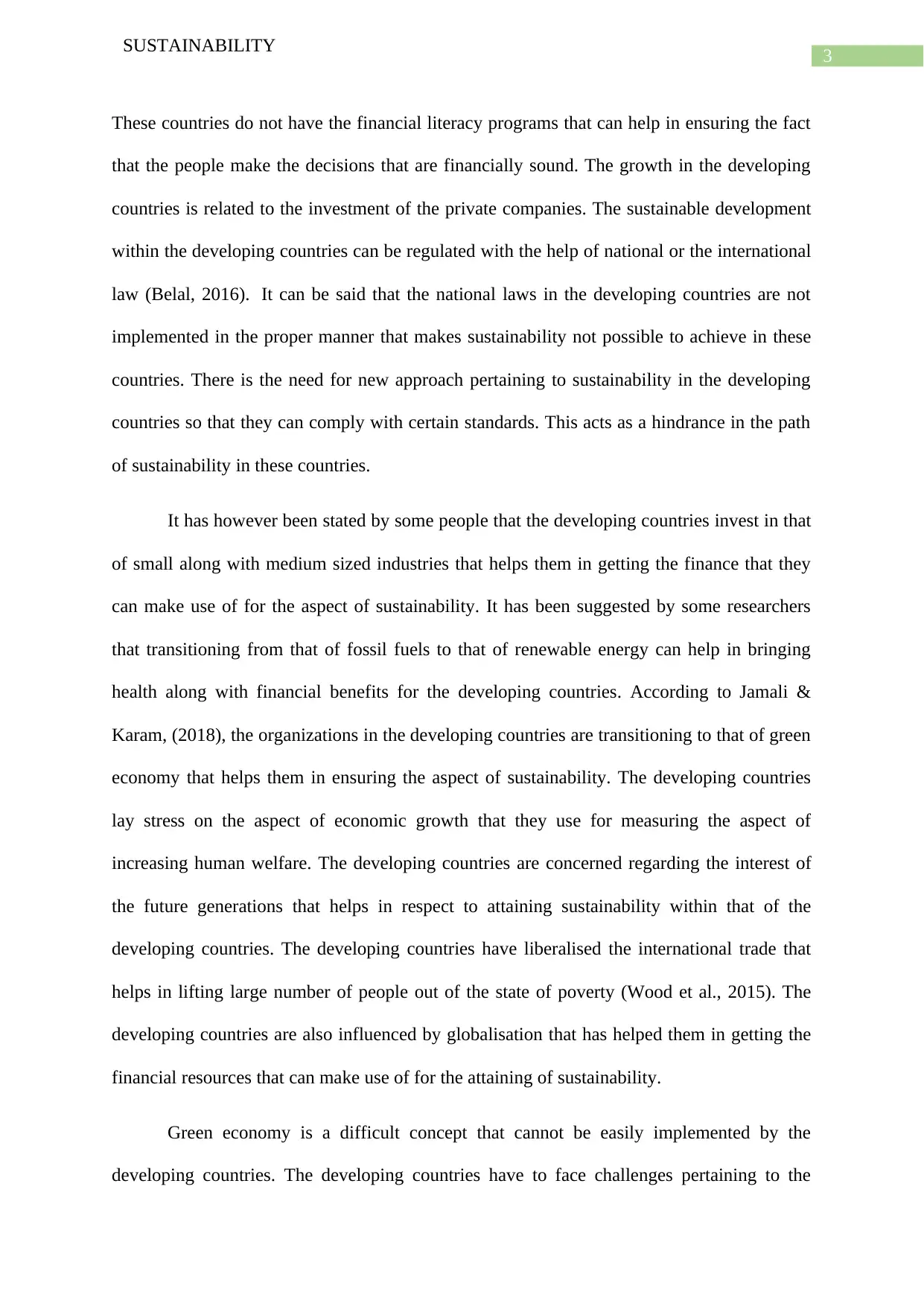
3
SUSTAINABILITY
These countries do not have the financial literacy programs that can help in ensuring the fact
that the people make the decisions that are financially sound. The growth in the developing
countries is related to the investment of the private companies. The sustainable development
within the developing countries can be regulated with the help of national or the international
law (Belal, 2016). It can be said that the national laws in the developing countries are not
implemented in the proper manner that makes sustainability not possible to achieve in these
countries. There is the need for new approach pertaining to sustainability in the developing
countries so that they can comply with certain standards. This acts as a hindrance in the path
of sustainability in these countries.
It has however been stated by some people that the developing countries invest in that
of small along with medium sized industries that helps them in getting the finance that they
can make use of for the aspect of sustainability. It has been suggested by some researchers
that transitioning from that of fossil fuels to that of renewable energy can help in bringing
health along with financial benefits for the developing countries. According to Jamali &
Karam, (2018), the organizations in the developing countries are transitioning to that of green
economy that helps them in ensuring the aspect of sustainability. The developing countries
lay stress on the aspect of economic growth that they use for measuring the aspect of
increasing human welfare. The developing countries are concerned regarding the interest of
the future generations that helps in respect to attaining sustainability within that of the
developing countries. The developing countries have liberalised the international trade that
helps in lifting large number of people out of the state of poverty (Wood et al., 2015). The
developing countries are also influenced by globalisation that has helped them in getting the
financial resources that can make use of for the attaining of sustainability.
Green economy is a difficult concept that cannot be easily implemented by the
developing countries. The developing countries have to face challenges pertaining to the
SUSTAINABILITY
These countries do not have the financial literacy programs that can help in ensuring the fact
that the people make the decisions that are financially sound. The growth in the developing
countries is related to the investment of the private companies. The sustainable development
within the developing countries can be regulated with the help of national or the international
law (Belal, 2016). It can be said that the national laws in the developing countries are not
implemented in the proper manner that makes sustainability not possible to achieve in these
countries. There is the need for new approach pertaining to sustainability in the developing
countries so that they can comply with certain standards. This acts as a hindrance in the path
of sustainability in these countries.
It has however been stated by some people that the developing countries invest in that
of small along with medium sized industries that helps them in getting the finance that they
can make use of for the aspect of sustainability. It has been suggested by some researchers
that transitioning from that of fossil fuels to that of renewable energy can help in bringing
health along with financial benefits for the developing countries. According to Jamali &
Karam, (2018), the organizations in the developing countries are transitioning to that of green
economy that helps them in ensuring the aspect of sustainability. The developing countries
lay stress on the aspect of economic growth that they use for measuring the aspect of
increasing human welfare. The developing countries are concerned regarding the interest of
the future generations that helps in respect to attaining sustainability within that of the
developing countries. The developing countries have liberalised the international trade that
helps in lifting large number of people out of the state of poverty (Wood et al., 2015). The
developing countries are also influenced by globalisation that has helped them in getting the
financial resources that can make use of for the attaining of sustainability.
Green economy is a difficult concept that cannot be easily implemented by the
developing countries. The developing countries have to face challenges pertaining to the
Paraphrase This Document
Need a fresh take? Get an instant paraphrase of this document with our AI Paraphraser
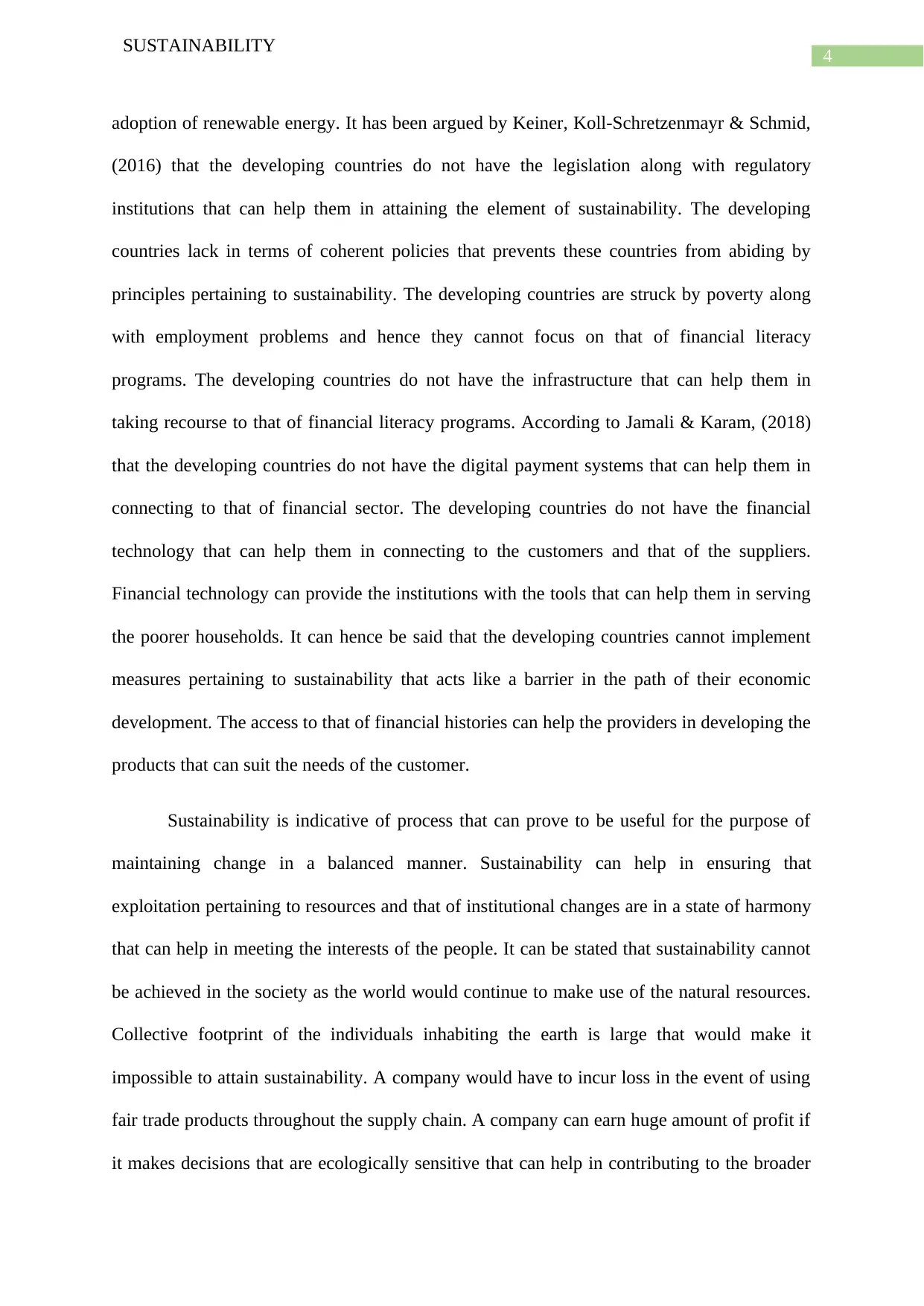
4
SUSTAINABILITY
adoption of renewable energy. It has been argued by Keiner, Koll-Schretzenmayr & Schmid,
(2016) that the developing countries do not have the legislation along with regulatory
institutions that can help them in attaining the element of sustainability. The developing
countries lack in terms of coherent policies that prevents these countries from abiding by
principles pertaining to sustainability. The developing countries are struck by poverty along
with employment problems and hence they cannot focus on that of financial literacy
programs. The developing countries do not have the infrastructure that can help them in
taking recourse to that of financial literacy programs. According to Jamali & Karam, (2018)
that the developing countries do not have the digital payment systems that can help them in
connecting to that of financial sector. The developing countries do not have the financial
technology that can help them in connecting to the customers and that of the suppliers.
Financial technology can provide the institutions with the tools that can help them in serving
the poorer households. It can hence be said that the developing countries cannot implement
measures pertaining to sustainability that acts like a barrier in the path of their economic
development. The access to that of financial histories can help the providers in developing the
products that can suit the needs of the customer.
Sustainability is indicative of process that can prove to be useful for the purpose of
maintaining change in a balanced manner. Sustainability can help in ensuring that
exploitation pertaining to resources and that of institutional changes are in a state of harmony
that can help in meeting the interests of the people. It can be stated that sustainability cannot
be achieved in the society as the world would continue to make use of the natural resources.
Collective footprint of the individuals inhabiting the earth is large that would make it
impossible to attain sustainability. A company would have to incur loss in the event of using
fair trade products throughout the supply chain. A company can earn huge amount of profit if
it makes decisions that are ecologically sensitive that can help in contributing to the broader
SUSTAINABILITY
adoption of renewable energy. It has been argued by Keiner, Koll-Schretzenmayr & Schmid,
(2016) that the developing countries do not have the legislation along with regulatory
institutions that can help them in attaining the element of sustainability. The developing
countries lack in terms of coherent policies that prevents these countries from abiding by
principles pertaining to sustainability. The developing countries are struck by poverty along
with employment problems and hence they cannot focus on that of financial literacy
programs. The developing countries do not have the infrastructure that can help them in
taking recourse to that of financial literacy programs. According to Jamali & Karam, (2018)
that the developing countries do not have the digital payment systems that can help them in
connecting to that of financial sector. The developing countries do not have the financial
technology that can help them in connecting to the customers and that of the suppliers.
Financial technology can provide the institutions with the tools that can help them in serving
the poorer households. It can hence be said that the developing countries cannot implement
measures pertaining to sustainability that acts like a barrier in the path of their economic
development. The access to that of financial histories can help the providers in developing the
products that can suit the needs of the customer.
Sustainability is indicative of process that can prove to be useful for the purpose of
maintaining change in a balanced manner. Sustainability can help in ensuring that
exploitation pertaining to resources and that of institutional changes are in a state of harmony
that can help in meeting the interests of the people. It can be stated that sustainability cannot
be achieved in the society as the world would continue to make use of the natural resources.
Collective footprint of the individuals inhabiting the earth is large that would make it
impossible to attain sustainability. A company would have to incur loss in the event of using
fair trade products throughout the supply chain. A company can earn huge amount of profit if
it makes decisions that are ecologically sensitive that can help in contributing to the broader
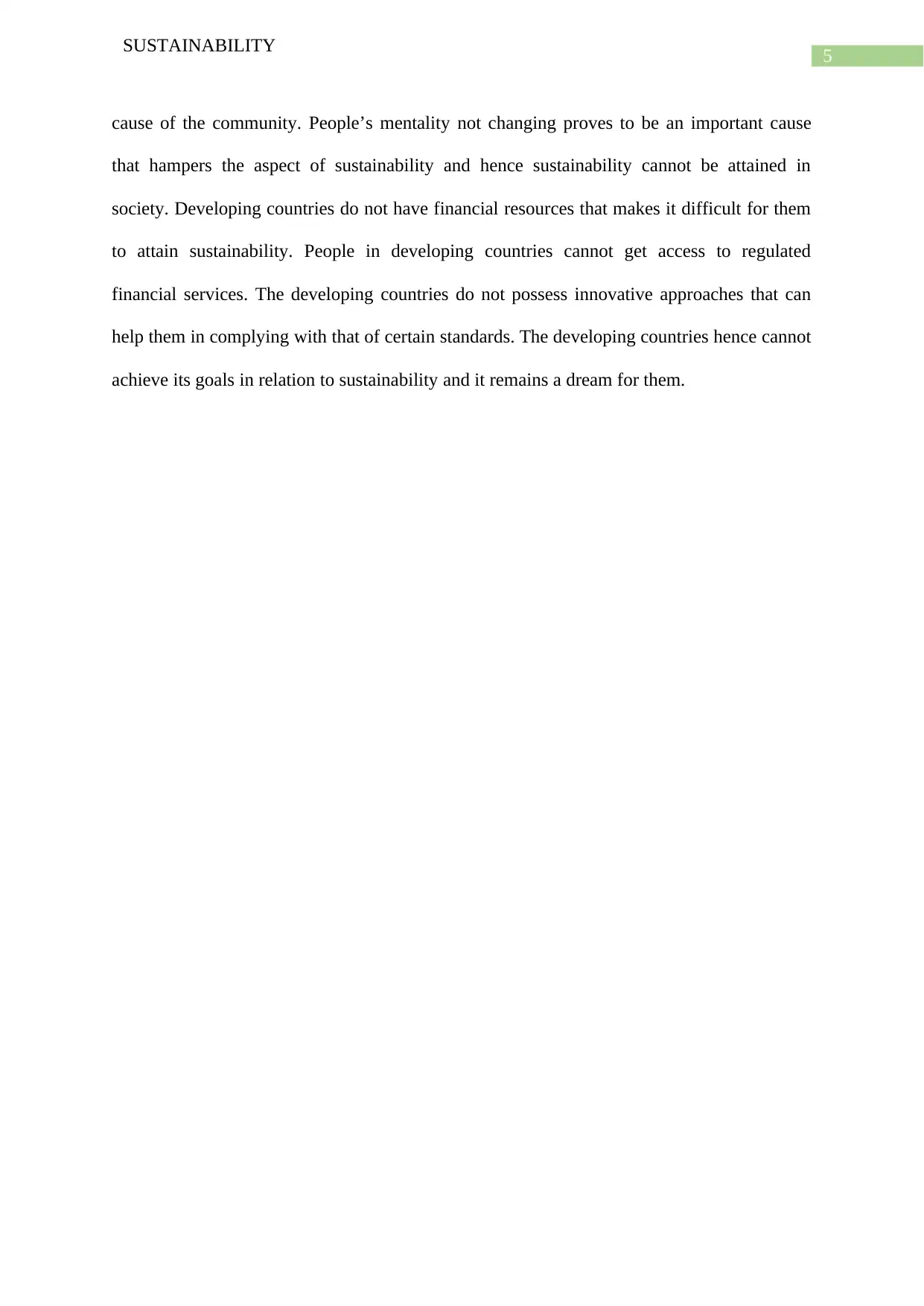
5
SUSTAINABILITY
cause of the community. People’s mentality not changing proves to be an important cause
that hampers the aspect of sustainability and hence sustainability cannot be attained in
society. Developing countries do not have financial resources that makes it difficult for them
to attain sustainability. People in developing countries cannot get access to regulated
financial services. The developing countries do not possess innovative approaches that can
help them in complying with that of certain standards. The developing countries hence cannot
achieve its goals in relation to sustainability and it remains a dream for them.
SUSTAINABILITY
cause of the community. People’s mentality not changing proves to be an important cause
that hampers the aspect of sustainability and hence sustainability cannot be attained in
society. Developing countries do not have financial resources that makes it difficult for them
to attain sustainability. People in developing countries cannot get access to regulated
financial services. The developing countries do not possess innovative approaches that can
help them in complying with that of certain standards. The developing countries hence cannot
achieve its goals in relation to sustainability and it remains a dream for them.
⊘ This is a preview!⊘
Do you want full access?
Subscribe today to unlock all pages.

Trusted by 1+ million students worldwide
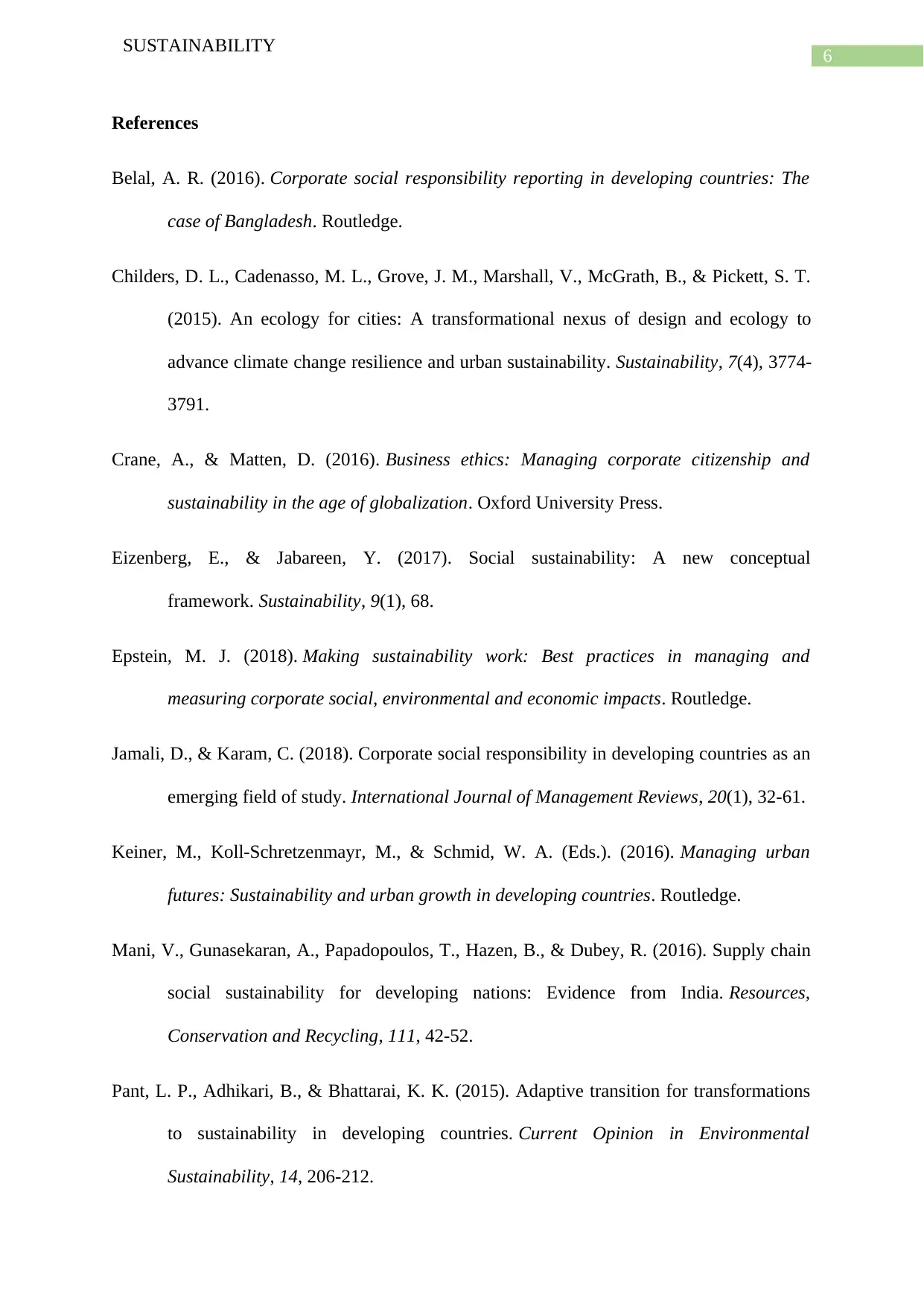
6
SUSTAINABILITY
References
Belal, A. R. (2016). Corporate social responsibility reporting in developing countries: The
case of Bangladesh. Routledge.
Childers, D. L., Cadenasso, M. L., Grove, J. M., Marshall, V., McGrath, B., & Pickett, S. T.
(2015). An ecology for cities: A transformational nexus of design and ecology to
advance climate change resilience and urban sustainability. Sustainability, 7(4), 3774-
3791.
Crane, A., & Matten, D. (2016). Business ethics: Managing corporate citizenship and
sustainability in the age of globalization. Oxford University Press.
Eizenberg, E., & Jabareen, Y. (2017). Social sustainability: A new conceptual
framework. Sustainability, 9(1), 68.
Epstein, M. J. (2018). Making sustainability work: Best practices in managing and
measuring corporate social, environmental and economic impacts. Routledge.
Jamali, D., & Karam, C. (2018). Corporate social responsibility in developing countries as an
emerging field of study. International Journal of Management Reviews, 20(1), 32-61.
Keiner, M., Koll-Schretzenmayr, M., & Schmid, W. A. (Eds.). (2016). Managing urban
futures: Sustainability and urban growth in developing countries. Routledge.
Mani, V., Gunasekaran, A., Papadopoulos, T., Hazen, B., & Dubey, R. (2016). Supply chain
social sustainability for developing nations: Evidence from India. Resources,
Conservation and Recycling, 111, 42-52.
Pant, L. P., Adhikari, B., & Bhattarai, K. K. (2015). Adaptive transition for transformations
to sustainability in developing countries. Current Opinion in Environmental
Sustainability, 14, 206-212.
SUSTAINABILITY
References
Belal, A. R. (2016). Corporate social responsibility reporting in developing countries: The
case of Bangladesh. Routledge.
Childers, D. L., Cadenasso, M. L., Grove, J. M., Marshall, V., McGrath, B., & Pickett, S. T.
(2015). An ecology for cities: A transformational nexus of design and ecology to
advance climate change resilience and urban sustainability. Sustainability, 7(4), 3774-
3791.
Crane, A., & Matten, D. (2016). Business ethics: Managing corporate citizenship and
sustainability in the age of globalization. Oxford University Press.
Eizenberg, E., & Jabareen, Y. (2017). Social sustainability: A new conceptual
framework. Sustainability, 9(1), 68.
Epstein, M. J. (2018). Making sustainability work: Best practices in managing and
measuring corporate social, environmental and economic impacts. Routledge.
Jamali, D., & Karam, C. (2018). Corporate social responsibility in developing countries as an
emerging field of study. International Journal of Management Reviews, 20(1), 32-61.
Keiner, M., Koll-Schretzenmayr, M., & Schmid, W. A. (Eds.). (2016). Managing urban
futures: Sustainability and urban growth in developing countries. Routledge.
Mani, V., Gunasekaran, A., Papadopoulos, T., Hazen, B., & Dubey, R. (2016). Supply chain
social sustainability for developing nations: Evidence from India. Resources,
Conservation and Recycling, 111, 42-52.
Pant, L. P., Adhikari, B., & Bhattarai, K. K. (2015). Adaptive transition for transformations
to sustainability in developing countries. Current Opinion in Environmental
Sustainability, 14, 206-212.
Paraphrase This Document
Need a fresh take? Get an instant paraphrase of this document with our AI Paraphraser
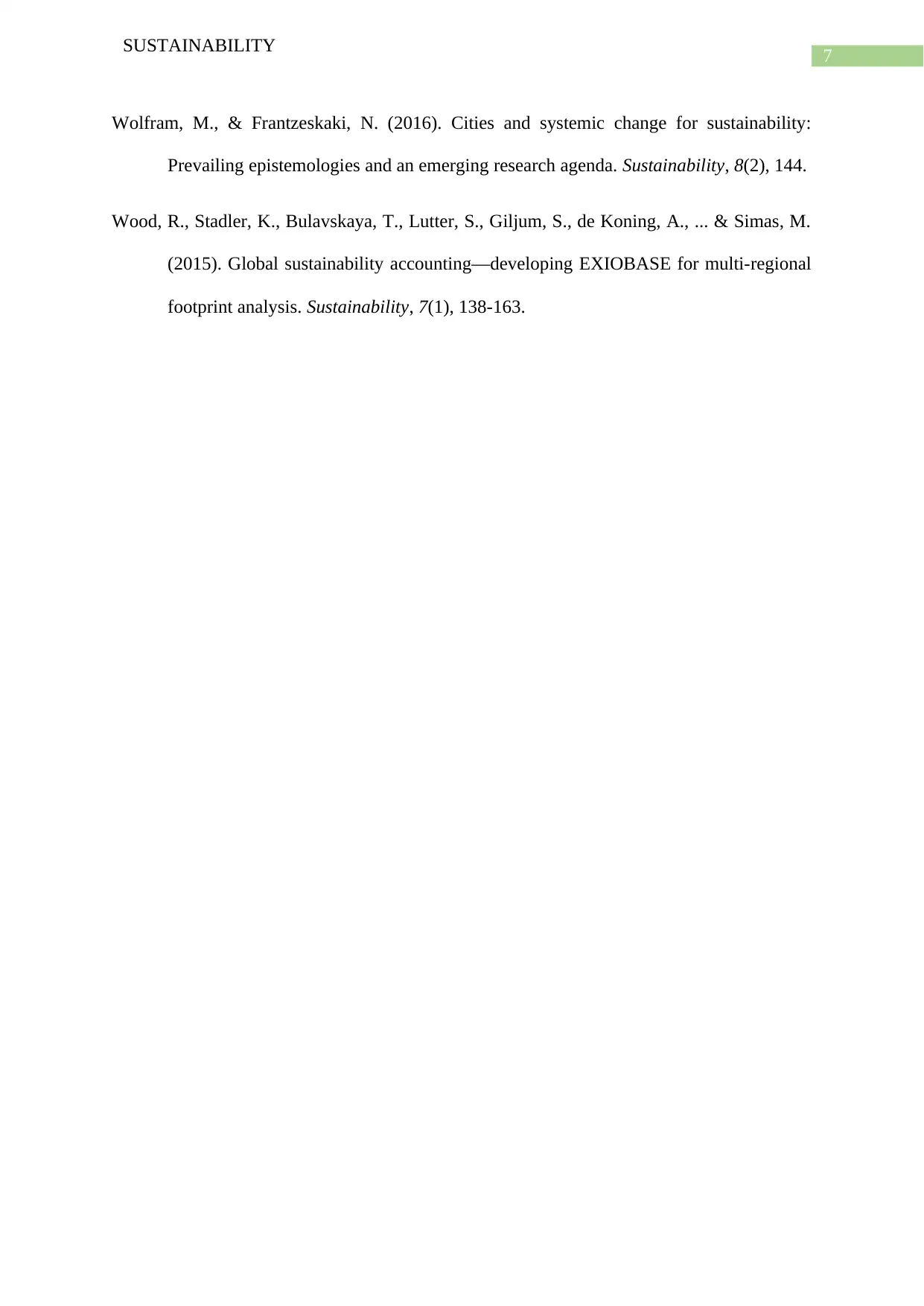
7
SUSTAINABILITY
Wolfram, M., & Frantzeskaki, N. (2016). Cities and systemic change for sustainability:
Prevailing epistemologies and an emerging research agenda. Sustainability, 8(2), 144.
Wood, R., Stadler, K., Bulavskaya, T., Lutter, S., Giljum, S., de Koning, A., ... & Simas, M.
(2015). Global sustainability accounting—developing EXIOBASE for multi-regional
footprint analysis. Sustainability, 7(1), 138-163.
SUSTAINABILITY
Wolfram, M., & Frantzeskaki, N. (2016). Cities and systemic change for sustainability:
Prevailing epistemologies and an emerging research agenda. Sustainability, 8(2), 144.
Wood, R., Stadler, K., Bulavskaya, T., Lutter, S., Giljum, S., de Koning, A., ... & Simas, M.
(2015). Global sustainability accounting—developing EXIOBASE for multi-regional
footprint analysis. Sustainability, 7(1), 138-163.
1 out of 8
Related Documents
Your All-in-One AI-Powered Toolkit for Academic Success.
+13062052269
info@desklib.com
Available 24*7 on WhatsApp / Email
![[object Object]](/_next/static/media/star-bottom.7253800d.svg)
Unlock your academic potential
Copyright © 2020–2026 A2Z Services. All Rights Reserved. Developed and managed by ZUCOL.




